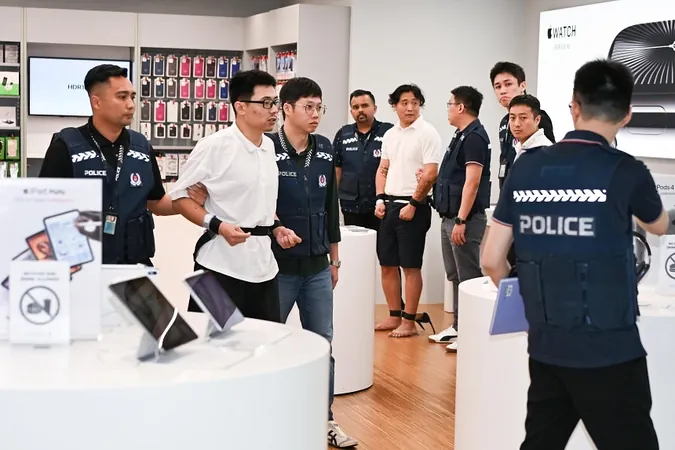
Foreign Syndicates Targeting Singapore Retailers with Sophisticated Credit Card Fraud Schemes
2024-11-14
Author: Li
Introduction
SINGAPORE – A disturbing trend has emerged where international syndicates are sending foreigners to Singapore to execute a string of high-profile credit card frauds, particularly targeting renowned retailers such as the Apple Store and Best Denki. This alarming development has prompted widespread concern among businesses and law enforcement alike.
Method of Operation
These criminal syndicates are believed to be orchestrating their operations by stealing credit card information from victims through elaborate online phishing scams, which have become increasingly sophisticated. The stolen credit details are then uploaded onto a mobile payment app that can be remotely controlled, allowing for seamless and contactless transactions.
Individuals recruited from various countries via social media platforms find themselves in Singapore to purchase high-value items, including the latest smartphones, electronic gadgets, and even gold bars, using these fraudulent payment methods. Once these items are secured, the perpetrators quickly resell them for cash, often at a significant profit.
Recent Incidents
Recent reports indicate a surge in such fraudulent activities. Since November 4 alone, at least 10 victims have reported unauthorized transactions exceeding $100,000 linked to e-commerce scams, with many of these charges involving high-end electronics and luxury items.
In a notable police operation on November 6 and 7, three Chinese nationals aged 29 to 36 were apprehended as part of an investigation into a transnational syndicate. Authorities seized over $20,000 in cash, four gold bars, and 27 iPhones, underscoring the scale of this fraudulent network. The suspects, Zhang Tianyu, Xu Zhaochen, and Li Xueqi, were subsequently charged with cheating after allegedly purchasing iPhones from the Apple Store located on Orchard Road.
Ongoing Investigations
The police’s investigative efforts continued on November 14 when they transported the suspects to an Apple reseller, iStudio at Bugis Junction, for questioning in restraints—a stark reminder of the seriousness of these offenses. Authorities are still investigating a fourth individual linked to the syndicate, named Zhao Yongzhi.
A separate but similar incident on November 8 revealed yet another syndicate’s tactics when a Malaysian man and woman were arrested after attempting to buy mobile phones with a failed mobile wallet transaction. This duo, identified as Quek Jian Qing and Yong Huo Ying, was charged with conspiracy to commit credit card fraud at a Best Denki store in Parkway Parade.
Police Response and Retailer Advisory
Despite the similarities in modus operandi, police believe these cases might involve different fraud networks. To ensure business safety, law enforcement has issued advisories to retailers of high-value electronics and luxury goods, advising vigilance against contactless payment transactions that appear suspicious.
The police have urged retailers to remain alert for customers making multiple attempts at contactless payments, especially when previous transactions fail. Typical red flags include not requesting tax refunds, purchasing high-value items in single transactions, and concealing identities with caps or masks. Retail staff are recommended to politely assist, inquire about payment methods, and verify physical cards linked with mobile payments if necessary.
Conclusion
Authorities emphasize the critical role that retailers play in identifying and reporting suspicious activities, as these actions can significantly aid in preventing such crimes. With scam incidents skyrocketing, contributing to a staggering loss of over $385.6 million in the first half of 2024 alone, the urgency to combat these fraud schemes has never been greater.
The consequences for those found guilty of these scams are severe, with potential jail sentences of up to 10 years and hefty fines hanging over their heads. Singapore authorities maintain a zero-tolerance policy against fraudsters, highlighting the collective effort needed to uphold integrity and safety in the marketplace.

 Brasil (PT)
Brasil (PT)
 Canada (EN)
Canada (EN)
 Chile (ES)
Chile (ES)
 España (ES)
España (ES)
 France (FR)
France (FR)
 Hong Kong (EN)
Hong Kong (EN)
 Italia (IT)
Italia (IT)
 日本 (JA)
日本 (JA)
 Magyarország (HU)
Magyarország (HU)
 Norge (NO)
Norge (NO)
 Polska (PL)
Polska (PL)
 Schweiz (DE)
Schweiz (DE)
 Singapore (EN)
Singapore (EN)
 Sverige (SV)
Sverige (SV)
 Suomi (FI)
Suomi (FI)
 Türkiye (TR)
Türkiye (TR)